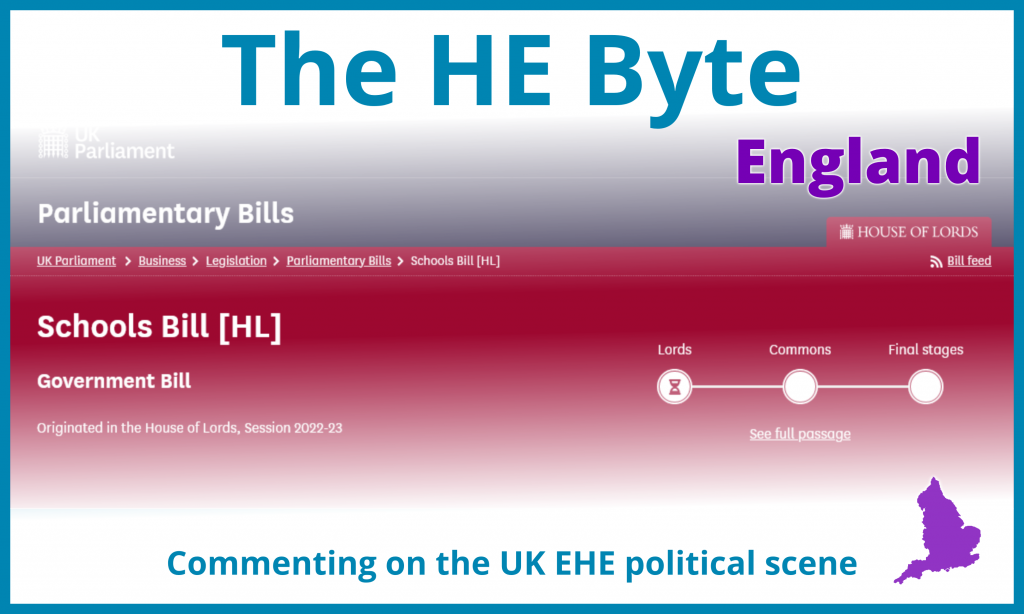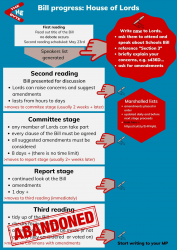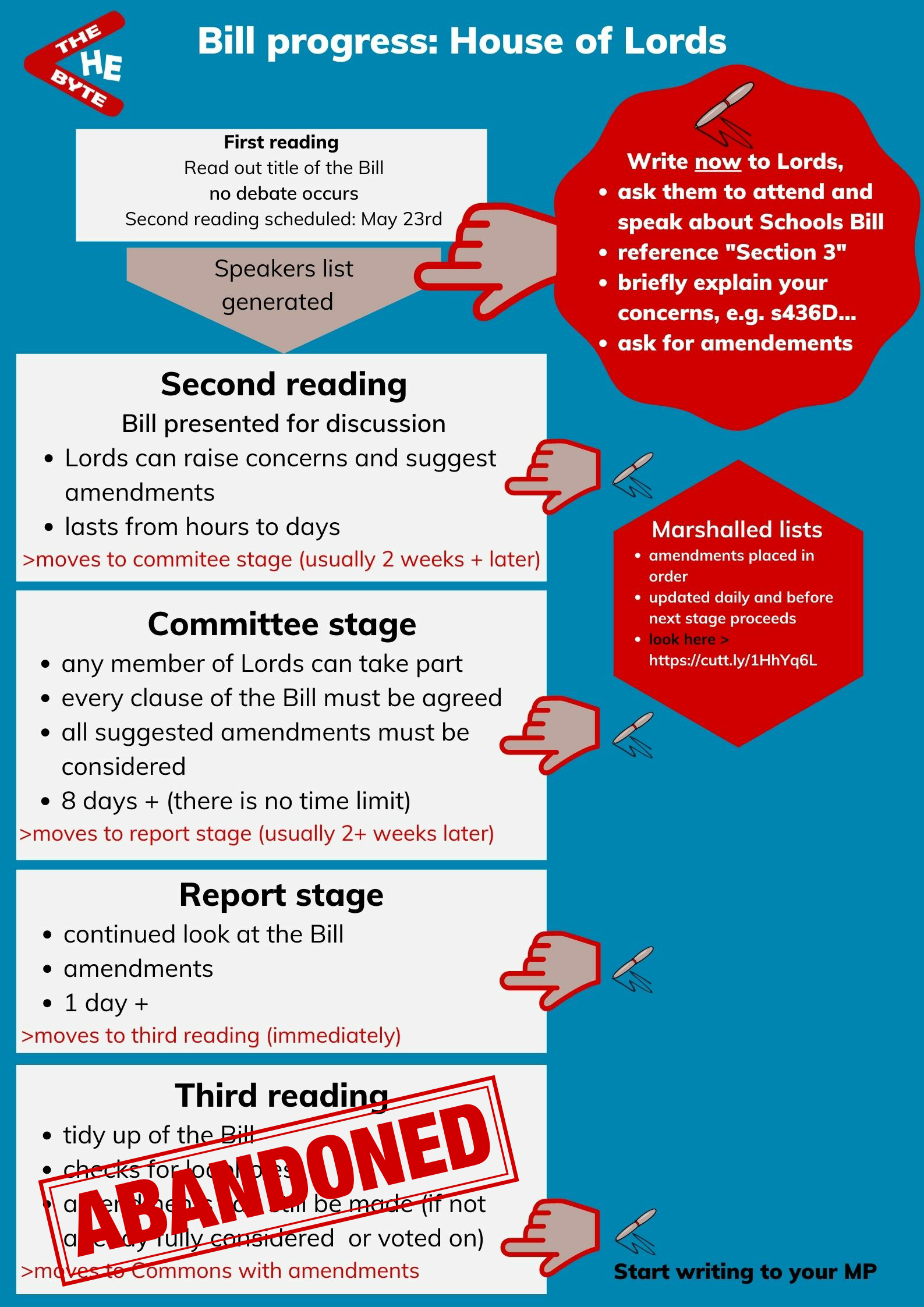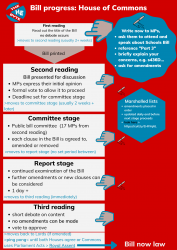 This page was being updated as the Bill progressed through Parliament. The Bill was officially taken off the table on 7 December. The most recent revision of this page took place on 17 December 2022.
This page was being updated as the Bill progressed through Parliament. The Bill was officially taken off the table on 7 December. The most recent revision of this page took place on 17 December 2022.
December 2022.
This Bill has been abandoned by the Government
On Wednesday 7 December, Education Secretary, Gillian Keegan MP, appeared before the Education Committee Select Committee.
It did not take Chair, Robin Walker MP, long to ask her the question which brought to an end three months of rumour and speculation.
In early September, shortly after the election of Liz Truss as Conservative Leader and therefore Prime Minister, reports began to circulate that her cabinet was going to abandon it. When Rishi Sunak replaced her, the Bill’s future was unclear. However, subsequent comments from ministers seemed to suggest that the Bill was not going to be pursued.
 Keegan removed any doubts when she answered Walker’s question with this simple statement “I can confirm that the Schools Bill will not progress in the third session.”
Keegan removed any doubts when she answered Walker’s question with this simple statement “I can confirm that the Schools Bill will not progress in the third session.”
However, that statement was followed by several concessions to those who continue to press for registration of children educated otherwise than in state supervised schools which, as we have highlighted previously, is intended by the DfE to be a first step which will be followed by two other more egregious steps. These are firstly to monitor all these children, and secondly to assess what they are being taught.
The sops she offered to the Committee were [emphasis added]:
- “A lot of the Schools White Paper is being implemented and did not require legislation in many cases, but we know that there has been interest, particularly in a couple of areas around legislating for children not in school and a register. I know that has been something the Committee has been pushing. Let us just say, we have heard your concerns and it is definitely a priority.” [Q237]
- “Right now, from what I understand, we can go quite a long way to achieving our aims to push this through non-legislative steps. We talked a little bit about the priority, and the registration safeguarding issue is a priority in terms of that too, but that is because we think we can go a long way not only in mainstream funding but also to improve the funding for special educational needs and high needs.” [Q243]
- “We definitely remain committed to legislating for children who are not on the school register, and we will continue to work until we make sure that they are all receiving a safe and suitable education. I cannot commit to dates or times because there is a process that has to be gone through and I do not have full control of it, but this is as much of a commitment and a priority for me as it is for the Committee.” [Q246]
The full transcript of the hearing can be read here and the original recording is available here.
The following video is a compilation of the key segments of the hearing, being questions Q237, Q243 & Q246 in the transcript, quoted in part above.
Related Bytes
- Demise of the Schools Bill Finally Confirmed 11 Dec 22
- Exactly the kind of education that everybody else is getting 1 Nov 22
- We Reckoned Without Our Host 3 Sep 22
- Carpe Diem! 1 Aug 22
- What on Earth is Happening to the Schools Bill? 25 Jul 22
- A Rush Job, Thrown into the Public Domain Before it was Ready? 16 Jun 22
- Understanding the Past Helps us to Address the Present 6 Jun 22
- Counting Children 26 May 22
- The Schools Bill has Landed! 18 May 22
Published Bill Documents
We recommend the Parallel Parliament’s Schools Bill page.
Unlike Parliament’s own website, links to all the relevant documents are displayed in a single list. The “Timeline of Bill Documents and Stages” list is ordered with the most recent publication at the top. Above that is a “Latest Key documents” list, which saves searching for the more important ones.
Official Parliamentary pages
Home page: Schools Bill [HL] – Parliamentary Bills
Various information is available via the ‘Publications ‘, ‘News‘ & ‘Stages‘ tabs, but this information is more readily accessible on the Parallel Parliament website cited above.
Direct links to key PDF documents listed on the Publications tab:
- HL Bill 49 (as amended on Report) | updated after Lords Report stage (18 July)
- HL Bill 35 (as amended in Committee) | updated after Lords Committee stage (27 June)
- HL Bill 1 (as introduced) | Schools Bill
- Explanatory Notes
- Delegated Powers Memorandum
- ECHR Memorandum from the Department for Education
- Impact Assessments
Resources provided through this website
MPs and Confidentiality
Information for home educating families contacting their Member of Parliament
- HE Byte Library | MPs and Confidentiality
Editable table containing extracts from the Bill:
These were tools for individuals to use to do their own work on understanding and tracking the Bill’s progress. They cover the sections listed below, not the whole Bill.
Sections included: 49, 50 & 51 (CNiS registers) | 57 (Independent educational institutions) | 64 (Powers of entry and investigation – independent educational institutions)
| Only containing relevant Bill clauses as it was updated after the Committee stage | Containing relevant Bill clauses and Lords Report stage amendments (updated 15 July) |
|---|---|
| Open Document Format | Open Document Format |
| Word Document Format | Word Document Format |
| Portable Document Format | Portable Document Format |
Notes on formats available:
-
- Open Documents (odt) original formatting – space for you to type notes
- Word Documents (doc) formatting may not be as reliable – space for you to type notes
- Portable Documents (pdf) best for printing – can only be annotated on screen
Archived files (PDF only):
- Relevant clauses in Bill as introduced
- Relevant clauses with amendments as tabled for HoL Committee stage
Flow charts of a Bill’s progress through both Houses
Click on the links below each image to download the file type you prefer
| House of Lords | House of Commons |
|---|---|
In December 2022 it was announced that a Third reading of the Bill would not be proposed in the Lords - see above for more details. | The Bill never reached the Commons, so none of these stages were timetabled. |
 |  |
| Original graphic file best for sharing on social media, etc. | Graphic file best for sharing on social media, etc |
| Original PDF file best for printing | PDF file best for printing |
If you want a more detailed explanation of the different stages of Government Bills in both Houses and how these differ, we highly recommend the Institute for Government’s Explainer “How are bills amended by Parliament?” For example it clarifies why all but the Government’s own amendments were either withdrawn or not moved in the Committee stage, “Amendments are routinely tabled, but rarely pushed to a vote at committee stage.” The reason for this is given in the Report stage section of the table on that page, “Any amendment can be made so long as it has not already been defeated during committee stage.” Thus withdrawing them allows the proposer more time to gather support for their amendment to be carried at a later date.
Helpful publications from others
It is impossible to list every item written by members of the various EHE organisations, communities and their supporters, so here is a very small selection which we hope you will find helpful.
Taunton Home Education
During the Second reading debate Baroness Meacher stated, “No doubt we have all had a briefing from Taunton Home Education asking us to oppose Parts 3 and 4. I have to say that I do not believe that these parts have anything really to do with Taunton Home Education, or indeed any other upstanding educational organisation.”
This is not the place to rebut Meacher’s misguided faith. We are pleased however that Taunton Home Education have given us permission to post their briefing here:
- Schools Bill [HL] Part 3 – Impact on home educated children
- Schools Bill 2022 Briefing for Home Educators | Caroline Ellis | YouTube
Ed Yourself | Fiona Nicholson
Helpful analysis of each stage of the Bills progress through Parliament – most recent item at the bottom of the list.
- Fiona’s initial analysis of the Bill and links to subsequent updates | Webpage
- Children Not in School Register (England) | Blog 18 May
- School Attendance Orders and Compulsory Registration FAQ | Blog 19 May
- School Attendance Orders FAQ Part 2 | Blog 20 May
- Home Education in the House of Lords Today | Blog 23 May
- Children Not In School – House of Lords May-June 2022 | Blog 2 June
- The Thing About Amendments | Blog 9 June
- Registration Discussed in Schools Bill House of Lords Committee | Blog 22 June
- Registration and Attendance Orders House of Lords Committee Schools Bill Day 5 | Blog 24 June
- Schools Bill Finishing In Lords And Reaching Commons | Blog 30 June
- Government Amending CNIS Register Schools Bill | Blog 7 July
- Government Amendments to CNIS Register make it Less Bad | Blog 11 July
- Schools Bill What The Heck Happened in the Lords Last Night | Blog 13 July
- Compulsory Registration Children Not In School – Parents Duties | Blog 3 Aug
- No Legislative Vehicle Without Schools Bill | Blog 13 Dec
Counting Children | Schools Bill briefing | data protection
A god place for information on the data protection aspects of the Bill.
- Holding page for Briefing with links to a variety of source documents
- PDF Briefing Paper – 10 pages
- #ScrapClause48 | Blog 3 June
- Second Reading briefing – 11 pages | 18 May
- Supporting explanatory notes to accompany the amendment – 10 pages | 16 June
- Report Stage briefing and proposed amendment – 18 pages | 6 July
- Supplemental briefing to their Report Stage briefing – 7 pages | 9 July
- Letter to the Secretary of State: Remove Part 3 | Blog 15 July – links to letter – 2 pages


